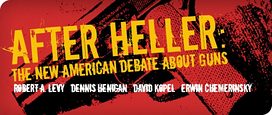On the issue of whether Heller represents conservative legal activism, I’d like to go back to an intriguing argument made by Bob Levy several days ago. Levy argues that the law professors who favor gun control, but reject the “militia purpose” view of the Second Amendment, effectively insulate Justice Scalia’s majority opinion from the charge of judicial activism. Levy’s unstated premise seems to be that since there are liberal law professors who agree with Justice Scalia’s view of the Second Amendment, Scalia’s opinion in Heller must be as principled as the views of the liberal law professors.
How does this follow? As Dean Chemerinsky points out, Scalia’s opinion enforced his own political views; if Levy accurately has characterized them, the views of the liberal law professors about the Second Amendment seem at odds with their own political views. Of course, the fact that Scalia’s ruling is consistent with his personal ideology is not sufficient to support the charge of judicial activism. The other necessary element is that his Heller opinion is indefensible in terms of any neutral principle of constitutional interpretation. In my judgment, this is also true of the views of the liberal law professors. The views espoused by Tribe, Levinson, and Amar on the Second Amendment are clearly wrong as a matter of text and history. (It is particularly notable that their interpretation of the Amendment has been subject to a withering attack by professional historians like Jack Rakove of Stanford, Saul Cornell of Ohio State, and many others.) Indeed, it is telling that the law professors failed to convince a single member of the liberal minority on the Supreme Court on the meaning of the Second Amendment. Scalia is wrong and unprincipled. The liberal law professors are just wrong.
There is no better illustration of the abandonment of neutral principles by the Heller majority, and Bob Levy, than their cavalier disregard of what the Supreme Court has termed “the first principle of constitutional interpretation” — that the Constitution must be read to give effect to every word and that interpretations that render portions of its text “mere surplusage” must be avoided. Neither Justice Scalia, nor Bob Levy, can deny that their interpretation renders the first thirteen words of the Amendment of no effect. The Second Amendment would guarantee a right to have guns in the home for self-defense whether those words were included or not. In place of the “no surplusage” principle, which dates to Marbury v. Madison, we now have a new principle, for which Justice Scalia offers no precedent, that the words of a constitutional provision must have merely a “logical connection” with one another. It is particularly galling that the Constitutional text rendered “surplusage” by the Supreme Court is the militia language of the Second Amendment since, as the historians have documented, that language underwent several material changes during the deliberations of the First Congress, including moving its placement in the amendment itself. If the militia language were merely “explanatory, not operative,” as maintained by Levy, why was it the subject of such careful editing? The Framers apparently attached far greater importance to it than do Levy and the Heller majority. Nor do Levy and the Heller majority offer any account of why the Framers would place “explanatory, not operative” language in the Second Amendment, but not in any other provision of the Bill of Rights.
On the issue of standard of review, Bob Levy recognizes that “different rights have different purposes and run up against different sets of government and private interests.” This is why the analogy between the First Amendment’s freedom of expression and our new Second Amendment right to private gun ownership must fail.
It is surely true, as he says, that the right to publish a booklet on bomb making has implications for public safety. But surely he would not maintain that this right is constitutionally analogous to the right to possess a bomb. I am not here claiming that Heller created a right to possess bombs, but rather showing that the right to possess lethal weaponry involves a different set of government and private interests than the right to express oneself about lethal weaponry.
For purposes of this discussion of Heller, the appropriate question is whether there is a constitutionally significant distinction between the “right of D.C. residents to keep a handgun in their home,” as Levy puts it, and the First Amendment right to talk about keeping a handgun in the home. I would hope that the answer is obvious, but perhaps not if you are unwilling to recognize the well-established additional risks of more guns in more homes — both for the homes themselves and for the general community.
To mention a few of the risks associated with exercising our newfound constitutional right to have a handgun in the home: (1) accidents with guns are more lethal than accidents with other weapons like knives; (2) a gun in the home is associated with a higher risk of suicide, especially among adolescents with no apparent psychiatric disorder; (3) incidents of domestic abuse involving firearms are far more likely to result in death than such incidents not involving firearms; and (4) because guns are in such high demand from the criminal element, large numbers of guns are stolen from residences, thus fueling the illegal market in guns.
One study of all fatal and nonfatal gunshot injuries involving guns kept in the home during a specific time period in Memphis, Seattle, and Galveston showed that for every time such a gun was used in a self-defense or legally justifiable shooting, there were four unintentional shootings, seven criminal assaults or homicides, and eleven attempted or completed suicides. Moreover, handguns are disproportionately involved in gun fatalities in the home. Surely it cannot be maintained that the government’s interest in regulating the right to handguns in the home is no different than its interest in regulating the right to speak about handguns in the home.

